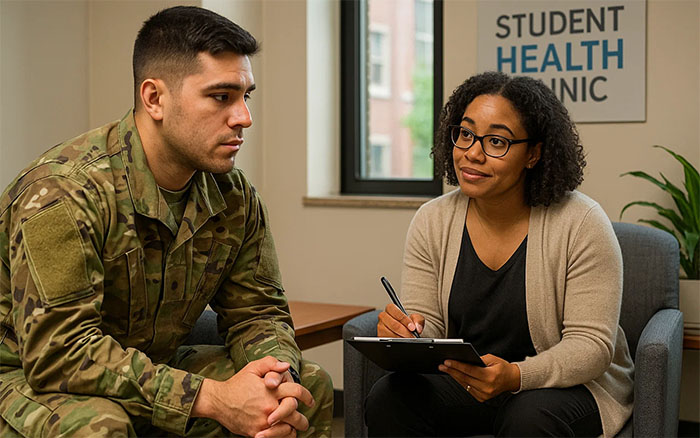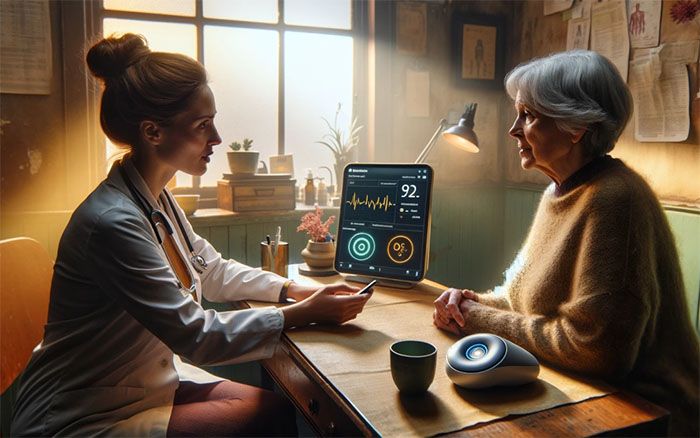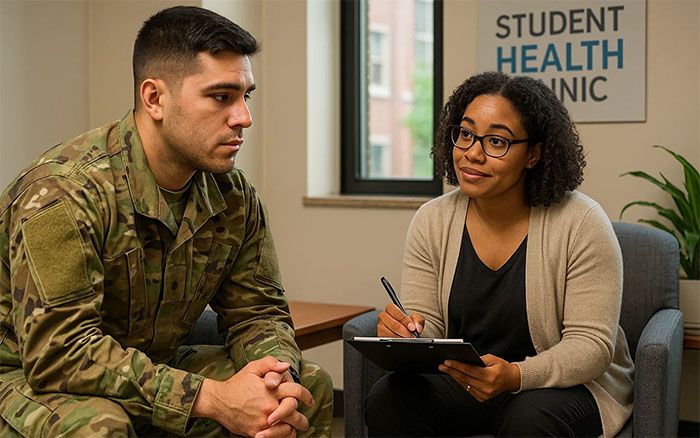Addressing The Unique Health & Counseling Needs of Student Veterans
Student veterans bring leadership, discipline, and life experience to college campuses. However, they also face distinctive challenges during their college experience.
According to the U.S. Department of Veterans Affairs, 62% of student veterans are first-generation college students, and many balance family, work, and school responsibilities alongside service-related stress or trauma. For campus health and counseling leaders, understanding and addressing these unique needs is key to fostering both academic and personal success.

Understanding the Distinct Needs of Student Veterans
The transition from structured military routines to the open environment of college can be both exciting and demanding for student veterans.
Important statistics about student veterans:
- About 70% of student veterans who received VA care in 2022 had at least one visit related to a mental health condition.
- About 15% of student veterans have seriously considered suicide, and nearly 37% screen positive for depression.
- Veteran students are half as likely to attend a high-graduation-rate-institution.
- Veterans disproportionately enroll in for-profit two- and four-year programs, while fewer attend public universities.
- 3 in 5 student veterans are working, and average 35 hours per week.
- About 2/3 of veteran students receive a VA disability rating.
Creating Veteran-Inclusive Health Services
Campus health centers can play a critical role in helping veterans feel understood and supported. For instance, staff training on military culture and trauma-informed care ensures that interactions are empathetic and effective.
Some strategies include:
- Using EHR reports to track and improve veteran outcomes: Running veteran-specific reports in MedicatOne helps leaders identify health trends — from visit types to PHQ-9 or GAD-7 scores — and measure the success of outreach programs or counseling interventions.
- Coordinate care with VA providers: Establish direct communication pathways for shared care plans while maintaining HIPAA and FERPA
- Offer flexible scheduling and telehealth options: Many veterans work or live off-campus; virtual appointments and asynchronous communication improve accessibility.
- Integrate proactive screenings: Routine checks for depression, sleep issues, or substance use can catch concerns early and connect student veterans to appropriate care.
These efforts not only streamline clinical operations but also signal to veterans that the campus health center understands their experiences and values their service.
Building Trauma-Informed Counseling Support
The transition from military to college life can be complex — the loss of structure, coupled with fears of stigma or misunderstanding, may discourage some student veterans from reaching out for help.
To build trust and engagement, counseling and wellness centers can:
- Provide cultural competency training — Understanding the language, structure, and values of military life helps counselors build rapport.
- Establish peer support groups — Connecting veterans with one another promotes belonging and shared understanding.
- Incorporate mind-body interventions — Techniques such as yoga, meditation, and breathing exercises have proven effective in managing PTSD symptoms and anxiety.
- Use integrated care models — Combining physical and mental health support through shared documentation in an EHR like MedicatOne improves continuity of care.
Leveraging Technology to Connect Veterans with Resources
Furthermore, technology can bridge gaps in awareness, coordination, and follow-up care. With MedicatOne, campus teams can:
- Deliver secure wellness resources and post-visit instructions through the student portal.
- Use automated alerts and reminders to share veteran events, group sessions, or upcoming workshops.
- Run risk management reports to flag patterns — such as repeat crisis visits or medication refills — and coordinate timely outreach.
When combined with personalized care, these digital touchpoints help create a continuous wellness experience that extends beyond the clinic visit.
Partnering Across Campus for Holistic Support
Supporting student veterans takes collaborative action. VPSAs, counseling directors, and campus health leaders can work together to:
- Develop veteran resource centers that blend academic advising with wellness navigation.
- Train faculty and staff to recognize signs of distress or academic disengagement.
- Collaborate with local VA offices and community organizations to expand access to specialized care.
This whole-campus approach ensures veterans don’t fall through the cracks and instead thrive as integral members of the student body.
Key Takeaways
Student veterans enrich campus communities but require intentional support tailored to their experiences. Integrating trauma-informed practices, collaborative care, and platforms like MedicatOne enables institutions to more effectively support student veterans.
















